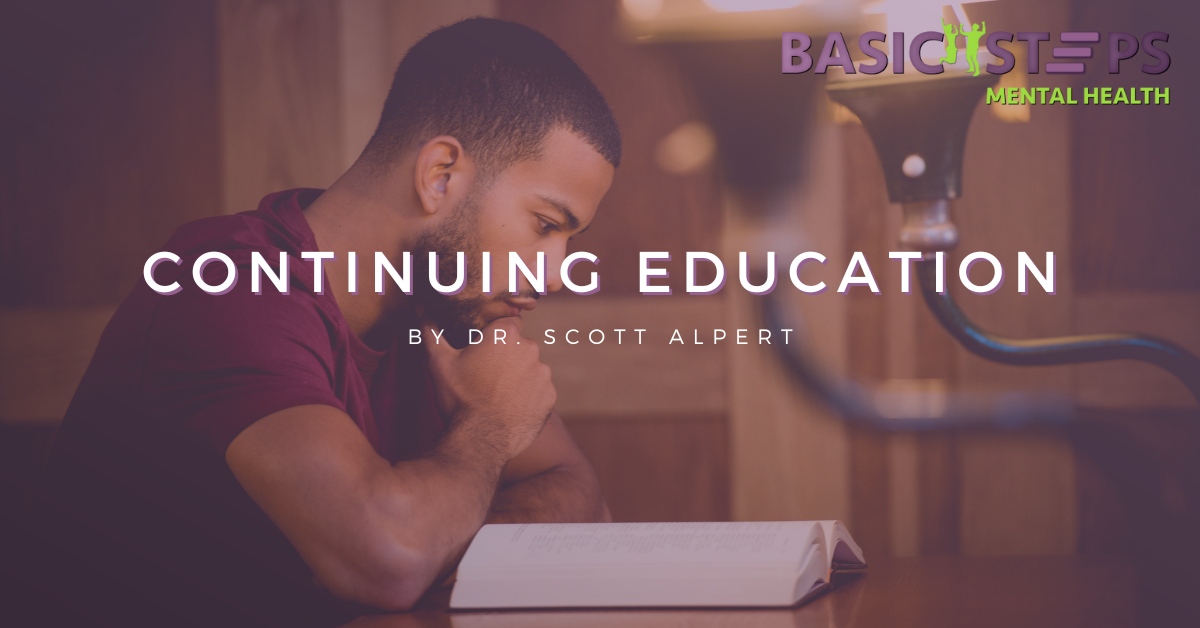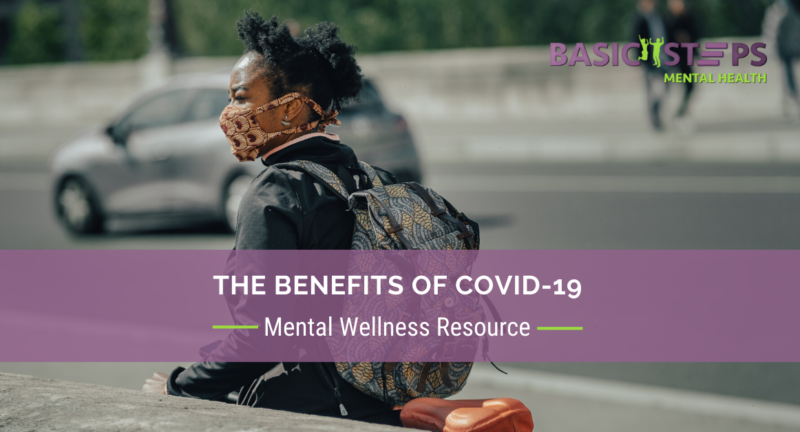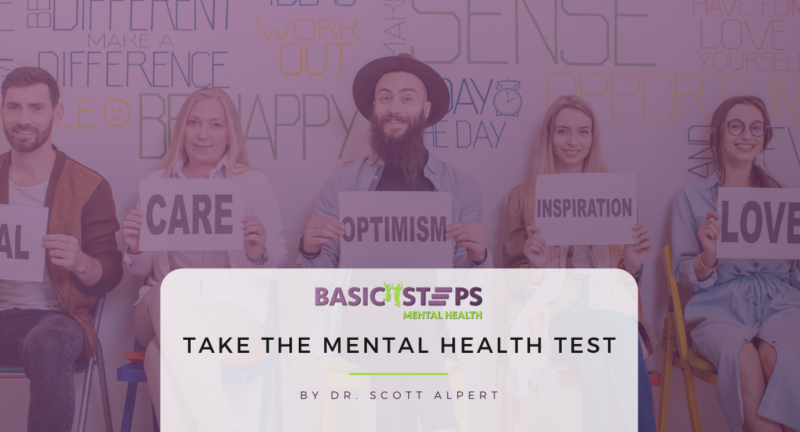
Continuing Education
Continuing coursework is crucial for people working in the mental health field. For me personally, I get bored presenting the same information over and over again, so I am always in search of information and techniques that grab my attention. To be honest, I get pretty giddy when something comes along that intuitively I know will be of great help. Sometimes I review approaches or periodicals just to make sure what I am presenting hasn’t strayed away from the intent of the people or person that presented the approach originally.
I have learned that psychology is not a one-size-fits-all approach and what works for one person may not work for the next. I have also learned that it is important to not blame the client if they don’t make any effort, or understand an approach. What is then needed is for me to present it in a different way that makes sense to them. With each clunk, I take it as an opportunity to get more information, look at the assumptions I may be making, and correct them. Psychology is a two-way street, the clients learn the way they do and it is for me to learn the proper way to present what I do that is understandable and inspiring.
To accomplish this I do my homework and read, and read, and read. I learned this from the top Psychiatrist in the state of California, where he headed all of the state hospitals, saw our clients at the Mental Health Urgent Care Center, still had time to see his own private clients, and there wasn’t a second where he didn’t have his nose in some technical manual.
I was talking about the book, “The Four Agreements” to our group this past week, and was hazy on one of the agreements, so I decided to read it again and was blown away. I originally read it 25 years ago, but not with the same clarity I have today. This makes sense since when I normally read something, it takes a few re-reads for me to fully grasp the concept. This worked well for me in college, and upon reading it this time I got inspired all over again.
In a nutshell, the book talks about the agreements we make with ourselves regarding life, situations, and interacting with others. There is a big spiritual element that sees life as an energetic exchange of either darkness or light. As we stay in the light, and communicate from that place, we pass along that light to others, though when we stay in a dark mood, we send poison to others and it can limit their growth and potential. Unfortunately, we live in a world based on fear and doubt, and darkness is ingrained into us all. Breaking away from this conditioning is what this book is all about.
Here are the Four Agreements:
- Be impeccable with your word.
If you are going to say something, say it in the positive. Our words are our power and we can wield either light or dark. When we put somebody down with our words we are using our darkness. When we pick somebody up with our words, we are sending them our light. When we are conscious, meaning that when we are aware of the tone at which we are operating, it is natural to be helpful and caring. Unconsciousness leads to death and destruction.
- Don’t take things personally.
Psychologically speaking, we are mirrors of one another. When somebody is pointing their finger at you and putting you down, according to my father, three fingers are pointing back to them. How would they know you are an idiot unless they are an idiot too? Misery loves company, so their darkness is where they currently are. Now if you take their darkness to heart, it shows you that you have bought into what they tell you because you believe what they are telling you is true. When this happens, you have some work to do on building yourself up because of your own negative mindset.
- Always do your best.
If you are going to do something, honor it. Do it as if you are doing something for the most important person in your life. Shoot, when I used to set floor tile, I always imagined I was doing the job for my parents and did the little extras to make it even more magnificent.
- Don’t make assumptions.
Often, we make believe that we can read a person and see right through them. Then we take this assumption as reality and make decisions based on false evidence. Can we 100% of the time know exactly what a person is thinking about us? 100% of the time? It is foolish for us to assume that we can do this 1% of the time. The best practice is to simply ask. “Are you thinking I can’t do this on my own?”
Our assumptions are based upon how we are internally with ourselves. Where did this assumption come from? Why did this come to mind? If we are in a down patch, we may assume this particular person is to blame for our situation. Is this based on facts?
The author goes on to comment on the programming we have all gone through in society. Oh, you see it on the news, in movies, on TV shows, and just the way people at work or in school talk. We were all born into a world not dominated by love and affection, but by fear, and we were groomed to fear most everything.
Look at children. Children have not had the full initiation of a negative mindset until they reach 8 or 9 years old (This is my theory). As you watch younger children at play, they are carefree, naturally happy, and have one thing on their mind – having fun! When was the last time you were carefree and had fun? When people live the four agreements, life is heart-centered, fun, and joyful! We take a piece of our goodness and gift it to others.
Reading this book reignited the joy that lives within me. It was a good reminder to put my all into everything I do, share kind words, and give hope to people who have been beaten down by society and lost their connection to life, love, and God.
After I finished the book, in the couples sessions I could see the agreements others were making with their partner. One may blame, put down, give reminders of past problems that occurred while the other agrees to take it on the chin for the overall good of the relationship. The only thing these agreements will do is bring people down and cause resentment.
One thing the author said is that we are the only animal that makes a mistake and relives it 1,000 times. Animals in the wild make a mistake once and learn from it. Through the conditioning of society, one must pay 1,000 times for their failures. Why? Because that was what we learned. Is this the best way to handle the situation? A better way is to learn from it and move on with that new knowledge like wild animals do.
A past fiance’ was reminding me of something I had done 5 years earlier. I told her that I remembered doing that and was so grateful that I had grown in numerous ways because of it. This didn’t appease my fiancé because she hadn’t processed the situation herself and wanted to take part in her societal blame game.
I encourage everyone to read the book and make comments on what you learned from it. It is a quick read and afterward, you may want to explore other books like, “The Power of Intention,” by Wayne Dyer, “The Power of Now,” by Echart Tolle, “Mastery” by George Leonard, “A Man’s Search for Meaning,” by Victor Frankyl, and “Who Moved my Cheese”, by Spencer Johnson. And, of course, “Self-Helping,” by Scott Alpert.
Happy studying.
Compassionate Care is Always Available
There are many more tools and strategies you can use in your pursuit of happiness. Here is where we come in. Contact us at Basic Steps Mental Health and let us support and educate you on this journey back to your loving heart center. Imagine living a heart-centered life, regardless of what is happening externally. We’d love to be of help.
For 25 years, Dr. Scott Alpert, the clinical director of Basic Steps Mental Health, has treated over 7,000 people with mental health and addiction problems, using a Psychological approach that mixes and matches ten of the top approaches used in the industry. We are here virtually and in-person to help you get through this COVID-19 pandemic and many other difficulties you may be experiencing.
May you have good mental health.
Related Posts
The Benefits of COVID-19
An article about the benefits of COVID? How could something that causes people to...
Take the Mental Health Test
Take the next few minutes to take the following mental health test. It will let...




